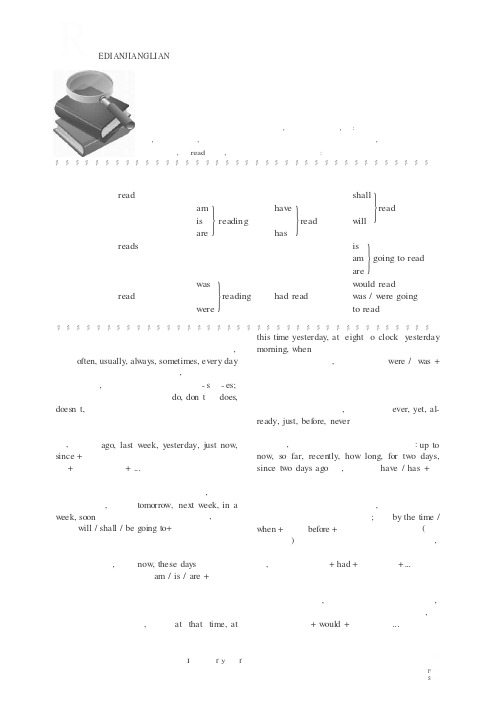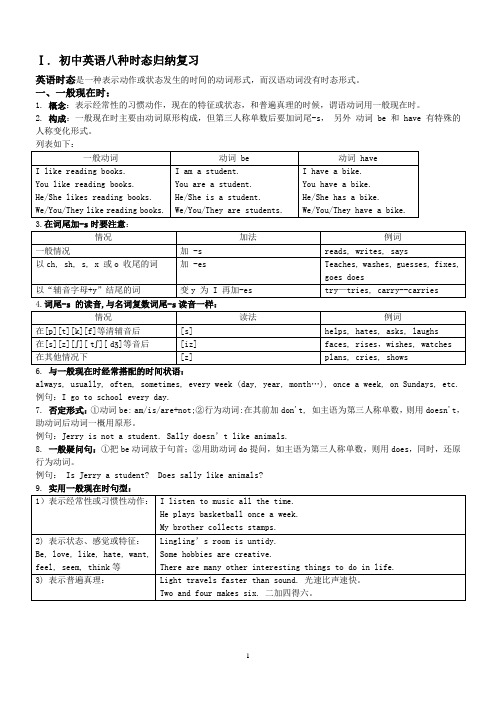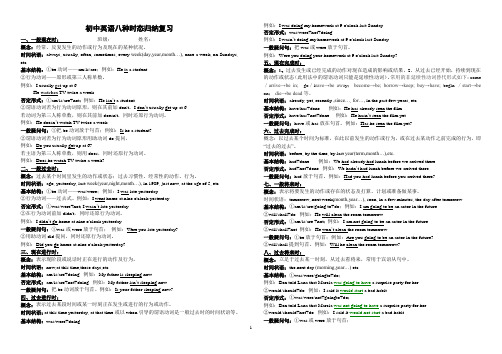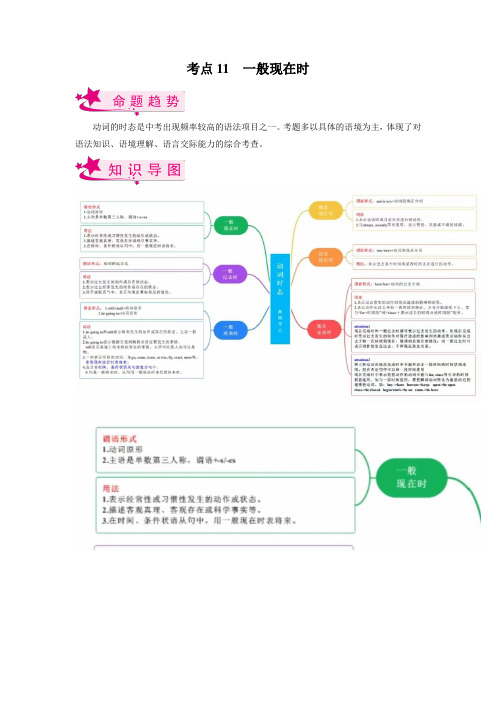初三总复习时态之一般现在时
中考英语总复习动词时态归纳总结

一般 时态 read 现
在 reads
过 read
去
进 行进 态
}am
is reading are
完 成时 态
}have read has
}was reading were
had read
将 来时 态
}shall read will
人称单数时, 实义谓语动词应在其后加- s 或- es;
六、现在完成时
构成疑问 句或否 定句时借 助 do, don’t 或 does,
现 在完成 时指过去 发生的 某一动作 对现
doesn’t, 谓语动词应用原形。
在 造成的影响 或结果, 此 时常与 ever, yet, al-
二、一般过去时
ready, just, before, never 等 时间状 语连 用。也
一般现在时表示经常性或习惯性的动作, morning, when 引导的 时间 状语从 句等表 示过
常与 often, usually, always, sometimes, every day 去的 时间状语连用, 谓语动 词由“were / was +
等时间状语连用。一般现在时中, 当主语是第三 现在分词”构成。
语 + 动词过去式 + ...”。
初中六种必须掌握时态(总复习)课件

B. Is; doing D. Are; taking
(
C
) 3 ___ the children ___ the radio?
A. Is; listening C. Are; listening to
B. Is; listening to D. Are; listening
定义:表示将要发生的动作或状态。
新华中学
初中英语 需掌握的 六种 动词时态 分别是哪些:
1.一般现在时 3.一般将来时 5.过去进行时 2.一般过去时 4.现在进行时
一般现在时
用法:经常或习惯性的动作 常用时间状语 : usually,sometimes,in spring,
every day,in the morning 动词构成 :动词原型. work 动词+S.(主语是第三人称单数)works 否定构成 : don’t+动原 doesn’t+动原 一般疑问构成及简答:Do+主语+动原+其它?Yes,I do. Does+主语+动原+其它?No,he doesn’t. 特殊疑问举例 :What do you often do on Sundays? Where does he live? 注意: 客观真理、个性特征句中谓语也用一般现在时.
练习
( ) 1 _____ here and ask him about it yesterday? A. Did you come B. Would you not go C. You didn't come D. Aren't you go ( ) 2 ___ he ___ a good time last Sunday? A. Were; were B. Did; do C. Did; has D. Did; have
初中英语八种时态归纳复习 详解

Ⅰ. 初中英语八种时态归纳复习英语时态是一种表示动作或状态发生的时间的动词形式,而汉语动词没有时态形式。
一、一般现在时:1. 概念:表示经常性的习惯动作,现在的特征或状态,和普遍真理的时候,谓语动词用一般现在时。
2. 构成:一般现在时主要由动词原形构成,但第三人称单数后要加词尾-s,另外动词be 和 have 有特殊的人称变化形式。
6. 与一般现在时经常搭配的时间状语:always, usually, often, sometimes, every week (day, year, month…), once a week, on Sundays, etc.例句:I go to school every day.7. 否定形式:①动词be: am/is/are+not;②行为动词:在其前加don't, 如主语为第三人称单数,则用doesn't,助动词后动词一概用原形。
例句:Jerry is not a student. Sally doesn’t like animals.8. 一般疑问句:①把be动词放于句首;②用助动词do提问,如主语为第三人称单数,则用does,同时,还原行为动词。
例句: Is Jerry a student? Does sally like animals?9. 实用一般现在时句型:二、一般过去时1.概念:过去某个时间里发生的动作或状态,现在已经不再继续;过去习惯性、经常性的动作、行为。
2.构成:一般过去时由动词的过去式表示,1) 动词be有 was, were 两个过去式,was 用于第一、第三人称, were 用于第二人称和第一、二、三人称的复数形式。
动词表。
读音规则:month…), in 1989, just now, at the age of 5, one day, long long ago, once upon a time, etc.4.否定形式:①was/were+not;②在行为动词前加助动词didn't,助动词后加动词原形。
中考总复习之英语常见时态(整理版)

finish/end come go out
3.常见句型 3.常见句型 主句(现在完成时)+since 从句(一般过去时). 主句(现在完成时)+since 从句(一般过去时). It is +一段时间+ since 从句(一般过去时). +一段时间 一段时间+ 从句(一般过去时).
It is three days since they borrowed that book. They have kept that book for three days句子: 译下列句子: 短暂性动词不能跟表示一段时间的状语 3、这本书他买了一年了 连用, 连用 必须转变成持续性动词 He has bought this book for a year .× He has had this book for a year .
4、 这本书他借了三天了。 、 这本书他借了三天了。
Exercise
(2008衢州中考 衢州中考) 衢州中考 --- Why didn’t you come and open the door for me, dear? --- Sorry, Jack. I ______ in the kitchen and didn’t hear you. A.was cooking C. wave cooked B. am cooking D. will cook
一般现在时的注意点: 一般现在时的注意点:
1 、表客观事实或普遍真理 goes The earth _____ (go) round the sun . 2 、 在when ,as soon as, until, after, before等到引导的时间状语从句和 引导 等到引导的时间状语从句和if 等到引导的时间状语从句和 的条件状语从句中, 一般现在时表示将来 表示将来. 的条件状语从句中 用一般现在时表示将来
初中英语八种时态归纳复习

初中英语八种时态归纳复习一、一般现在时:班级:姓名:概念:经常、反复发生的动作或行为及现在的某种状况。
时间状语:always, usually, often, sometimes, every week(day,year,month…), once a week, on Sundays, etc.基本结构:①be动词——am/is/are;例如:He is a student.②行为动词——原形或第三人称单数。
例如:I usually get up at 6.He watches TV twice a week.否定形式:①am/is/are+not; 例如:He isn’t a student.②谓语动词若为行为动词原形,则在其前加don't。
I don’t usually get up at 6.若动词为第三人称单数,则在其前加doesn't,同时还原行为动词。
例如:He doesn’t watch TV twice a week.一般疑问句:①把be动词放于句首;例如:Is he a student?②谓语动词若为行为动词原形用助动词do提问,例如:Do you usually get up at 6?若主语为第三人称单数,则用does,同时还原行为动词。
例如:Does he watch TV twice a week?二、一般过去时:概念:过去某个时间里发生的动作或状态;过去习惯性、经常性的动作、行为。
时间状语:ago, yesterday, last week(year,night,month…), in 1989, just now, at the age of 5, etc.基本结构:①be动词——was/were;例如:I was late yesterday.②行为动词——过去式。
例如:I went home at nine o'clock yesterday.否定形式:①was/were+not; I wasn’t late yesterday.②在行为动词前加didn't,同时还原行为动词。
考点11 一般现在时-备战2023年中考英语一轮复习考点帮(全国通用)(解析版)

考点11 一般现在时动词的时态是中考出现频率较高的语法项目之一。
考题多以具体的语境为主,体现了对语法知识、语境理解、语言交际能力的综合考查。
1. 一般现在时的用法;2. 一般现在时的构成。
考向一:一般现在时的用法①表示经常性、习惯性的动作或存在的状态。
常与频度副词连用。
I often take a walk in the park. 我经常在公园散步。
These T-shirts are new. 这些T恤衫是新的。
②表示客观事实、真理。
The sun rises in the east and sets in the west. 太阳东升西落。
③在时间、条件状语从句中表示将来的动作。
If it doesn’t rain tomorrow, I will go bike riding in the open air. 如果明天不下雨,我将在户外骑自行车。
I’ll tell her the good news when she comes back. 当她回来的时候,我将把这个好消息告诉她。
④表示按计划或安排将要发生的动作,可用一般现在时表将来。
但只限于start,begin,leave,go,come,arrive,return,take place等。
考向二:一般现在时的构成在一般情况下用动词原形,若主语为第三人称单数,一般在动词原形后加-s或-es。
情况构成方法例词一般情况直接加-s read→reads love→loves以s,o,x,ch,sh结尾加-espass→passes box→boxes teach→teaches wash→washes以辅音字母+ y结尾将y变为i,再加-es carry→carries study→studies 不规则变化have→has be→am/is/are1.The teacher told us that the earth ________ around the sun.A.moved B.moves C.had moved D.was moving【答案】B【详解】句意:老师告诉过我们地球围着太阳转。
(人教版)中考英语总复习语法:专题8-动词的时态、语态(101页)
(2)过去完成时与现在完成时的主要区别是时间参 照点不同: 过去完成时的时间参照点是某个“过去的” 时间;现在完成时的时间参照点是“现在”。因此现在 完成时中的很多规则,也适用于过去完成时。 When I got to the cinema, the film had been on. 当我到达电影院时,电影已经开始了。
以辅音字母+y结尾的动词, 把y变为i再加-ed
以一个元音字母加一个辅音 字母结尾的重读闭音节词, 双写结尾字母再加-ed
study→studied carry→carried stop→stopped drop→dropped prefer→preferred
3.一般将来时 (1)表示将来某个时间要发生的动作或存在的状 态,其构成形式:“will/shall+动词原形”。常与表 示将来的时间状语tomorrow,next week,in+一段时 间等连用。 当主语是第一人称I或we时,问句中一般用shall。
③表单纯性的将来,与人的主观愿望和判断无关 时。 If it's made of wood, it will float on water. 这要是木材做的,它能浮在水面上。 (4)当主句为一般将来时态时,在if,as soon as, until, when等引导的状语从句中用一般现在时代替一 般将来时。 I will call you as soon as I get there. 我一到那儿就给你打电话。
特殊情况:have→has,am/are→is 考查热点:如果主句为一般将来时,if,unless等 引导的条件状语从句和when,until,as soon as等引导 的时间状语从句常用一般现在时表示将来。 What about going climbing if it doesn't rain tomorrow? 如果明天不下雨,去爬山怎么样?
中考复习之动词以及一般现在、过去、将来时态讲义与句子简明结构
动词以及一般现在、过去、将来时态讲义与句子简明结构一.动词(verb)1.a.才能跟宾语。
如:get to school,arrive in Shenzhenb.c.d.2.二.the simple present tense)1.表示客观存在的状态或经常性、习惯性的动作。
2. 构成。
3. 时间状语:always, usually, often, sometimes, every week (day, year, month…), once aweek, on Sundays,4.the simple past tense)1.表示过去发生的动作或存在的状态。
2.或构成3. 时间状语:ago, yesterday, the day before yesterday, last week, last(year, night, month),in 1989, just now, at the age of 5, one day, long long ago4. 动词过去式的变化形式规则变化:a. 直接加-ed/d, 如:play-played, lie-liedb. 以辅音字母+y结尾,变y为i,加ed, 如:study-studiedc. 重读闭音节动词,双写末尾辅音字母,再加ed, 如:stop-stopped不规则变化(见不规则动词表)(A-A-A, A-A-B, A-B-B, A-B-C)5.在助动词did的帮助下,熟练掌握对一般过去时的肯定句进行否定、一般疑问句及回答和特殊疑问句的句型转换。
the simple future tense)1.表示将要发生的动作或计划打算要做的事。
2.时间状语:tomorrow, next day(week, month, year…),soon, the day after tomorrow,3.构成,通常情况下,两者可互换。
具体而言,主语+will+动词原形强调不以人的意愿为转移的客观将来,而主语+be going to+动词原形侧重一个人计划打算要做的事,主观性较强。
九年级英语总复习练习时态
九年级英语总复习练习时态、语态部分九年级英语课题组英语的时态(tense)是一种动词形式,不同的时态用以表示不同的时间与方式,下面就英语中常见的八种基本时态进行阐述,其它的时态都是在这八种时态的基础上结合而成的。
一、一般现在时:1.概念:经常、反复发生的动作或行为及现在的某种状况。
2.时间状语:always, usually, often, sometimes, every week (day, year, month…), once a week, on Sundays,3.基本结构:动词原形(如主语为第三人称单数,动词上要加(e)S)4.否定形式:am/is/are+not;此时态的谓语动词若为行为动词,则在其前加don't,如主语为第三人称单数,则用doesn't,同时还原行为动词。
5.一般疑问句:把be动词放于句首;用助动词do提问,如主语为第三人称单数,则用does,同时,还原行为动词。
6.例句:. It seldom(很少)snows here.He is always ready to help others.Action speaks louder than words.二、一般过去时:1.概念:过去某个时间里发生的动作或状态;过去习惯性、经常性的动作、行为。
2.时间状语:ago, yesterday, the day before yesterday, last week(year, night, month…), in 1989, just now, at the age of 5, one day, long long ago, once upona time, etc.3.基本结构:be动词;行为动词4.否定形式:was/were+not;在行为动词前加didn't,同时还原行为动词。
5.一般疑问句:was或were放于句首;用助动词do的过去式did 提问,同时还原行为动词。
初三英语中考专题复习---动词的时态和语态
The Past Continuous Tense
过去进行时用法
过时正进 I was doing my homework
at eight last night.
过段直进 They were watching TV from
nine to ten yesterday.
when, They were reading aloud while when the teacher came in.
5. By the time I was three, I _________ learning English. I’ve been learning it for 15 years.(2010 山东枣庄)
A. had finished B. had stopped C. had started
山东省中考真题
与 always
连用
My teacher is always smiling in class.
现在完成时
The Present Perfect Tense
现在完成时用法
I can’t find my pen. I have lost
过影响现 it.
Have you finished it yet ?
that night.
虚拟语气 If I were you, I would try again.
过去完成时
The Past Perfect Tense
过去完成时用法
过延到过 I had stayed in Beijing
for three years by then.
过去的过去
When plane
A. to lock B. work C. to work D lock
- 1、下载文档前请自行甄别文档内容的完整性,平台不提供额外的编辑、内容补充、找答案等附加服务。
- 2、"仅部分预览"的文档,不可在线预览部分如存在完整性等问题,可反馈申请退款(可完整预览的文档不适用该条件!)。
- 3、如文档侵犯您的权益,请联系客服反馈,我们会尽快为您处理(人工客服工作时间:9:00-18:30)。
初三总复习时态之一般现在时
1. 意义:1)表示现在经常发生的或习惯性的动作。
She catches a No。6 bus at six every morning。 (catch)
2)表示主语现有的特征。
He __likes______ English very much。(like)
3)表示客观事实和普遍真理.(在宾语从句中)
The sun rises in the east. (rise)
The teacher said there ___are_____12 months in a year.(be)
4) 在时间、条件状语从句,从句用 一般现在时表将来,即主将从现。条件句引导词if/
unless ;时间状语从句引导词 when, before, after, until, as soon as
I’ll help him if he __has___(have )any trouble.
2标志词: every morning/day/week/year,on Sundays, in the afternoon/evening ,
表频率的副词always, usually, often, sometimes, hardly ever, never, once/ twice/….a
week,
3. 构成:主语(其他人称)+ 动词原形;
主语(单三) + 动词变单三
Liu Ming usually TV after supper。 (watch)
Sometimes we _______football in the afternoon.(play)
4。 动词的第三人称单数形式
1) 一般在动词后加s
2)以辅音字母加y结尾的,变y为i加es。
3)以s, x, ch, sh, o 结尾的, 加es.
5。一般现在时的被动: am/is/ are +P。P。
).She often meets her friends during the holidays。
Her friend ____ ______ _______ during the holiday. (is often met)
2).We visit the museum every Sunday。
The museum _____ _________ every Sunday。 (is visited)
3)They don't plant trees in winter.
Trees ______ ________ in winter. (aren’t planted )
4)Do they sell books in that shop?
______books ______ in that shop? (Are, sold)
5)Where does mum keep flowers?
Where ______ flowers ________? (are, kept)
4、句型转换
变否定句 : 主语(其他人称)+don’t +动词原型
单三 +doesn't +动词原型
变一般疑问句 :Do + 主语(其他人称) +动词原型?
Does+ 单三 +动词原型?
一般现在时考试易出题:
1 do/does/has
(1)You do your homework at home。(否)
_____________________________。
(2)She does some washing every week.(疑)
______________________________。
(3)He has lunch at school 。(否)
______________________________.
比较:He has bought a lot of books。
_____ ____ ______a lot of books。
Exercise:
单项选择
1 —What’s Mr。 Clarke going to do tomorrow? (2002。福州)
—-He’ll go fishing if it __________.
A. not rain B. don’t rtain C. won’t rain D。 doesn't rain
2。— Could you please tell Peter that I want to talk to him? – Sure. I will let him know as
soon as he ______back. (06 河北)
A. comes B. came C。 has come D。 will come
3. —Is that Chris speaking? – Sorry, he isn’t in. He ______abroad on business。
A。 goes B。 went C. has gone D。 will go
4. Every year many foreigners ______to China to learn Chinese.
A. have come B。 comes C. came D. come
5。–I'm sorry to hear that Bill failed the exam again。—Don’t worry about him。 I’m sure
that he will never give up until he ______. (06 哈尔滨)
A。 succeed B. succeeds C. succeeded D。success
6. If it ______sunny tomorrow, I ______fishing in South Lake。
A。 is; go B。 will be; go C。 is ;will go D。 will be; will go
7. I will tell him as soon as he _____ back
A. come B。 comes C。 will come D。 came
8. ---— ____ Tom _____to work hard to help his family ?
—---—Yes, he _____.
A.Has,/,doesB。Do,has,does C。Does,has,has D.Does, have,does
9. We’ll go to play with snow if it ______ tomorrow.
A. snow B. snows C. will snow D. snowed
10。 Neither I nor he ______ French。
A. speak B. doesn’t speak C。 speaks D. doesn’t speak
句型转换
1。 Linda is good at playing tennis。 (改为否定句)
Linda _____ _______good at playing tennis. (06 济南)
2。 Kate usually goes to her office by bike。 (划线提问)
_______ ______Kate usually _____to her office。 (06济南)
3.Sam wants to look for a job in London after he graduates from university. (改为否定句)
(06 上海)
Sam ______ _____ to look for a job in London after he graduates from university。
4。 Lily has some red and blue pencils. (改为一般疑问句) (2002.福州)
______ Lily ______ any red and blue pencils?
5。Alice does the shopping on Sundays. (改为否定句) (2003。济南)
Alice ______ ______ the shopping on Sundays
6.YuYing often helps her mother do some housework。(划线提问)
____ ____ Yu Ying often _____ her mother _____?
Exercise答案:
单项选择:DACDB, CBDBC
句型转换:1。 is not 2.How, does, go 3.doesn’t want 4.Does, have 5。 doesn’t do 5。 What
does, help, do
